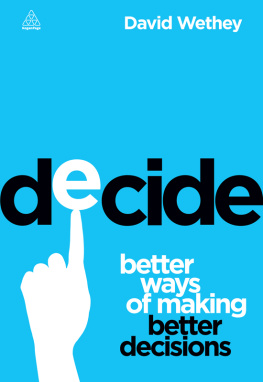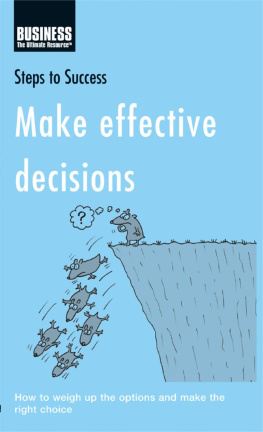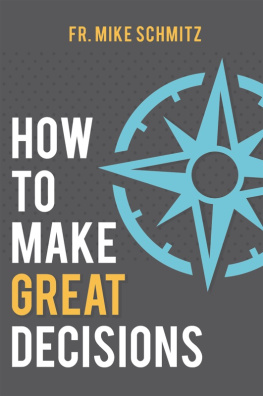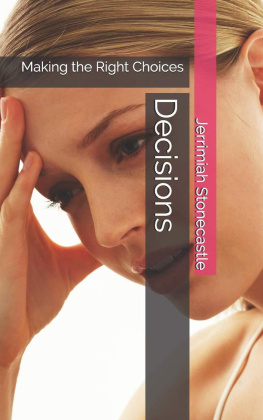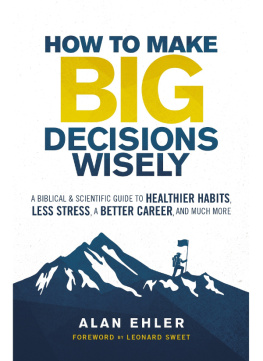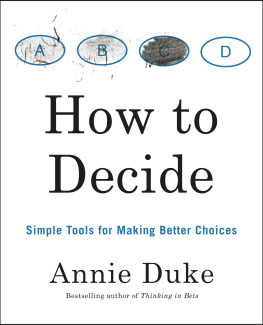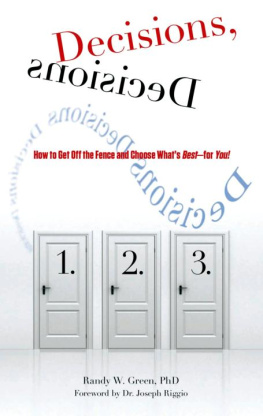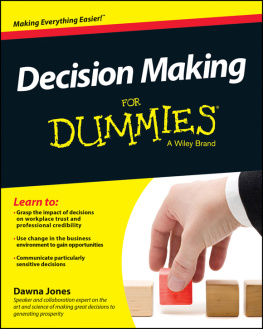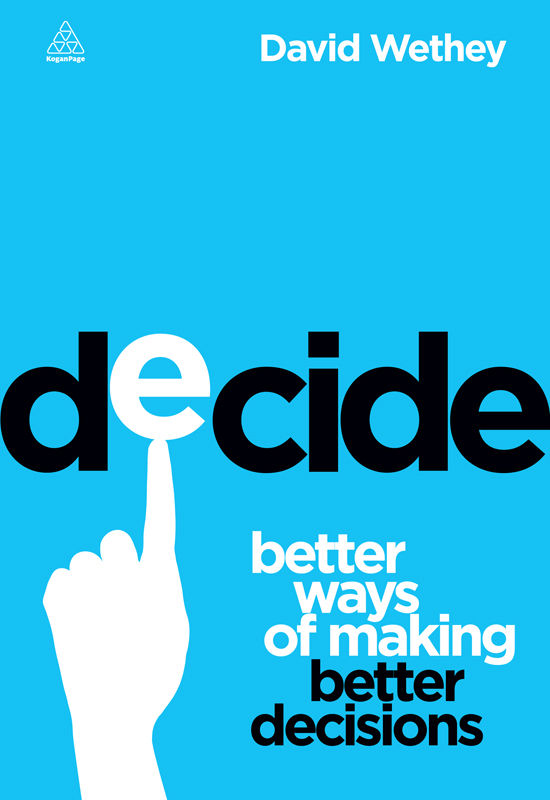Note on the Ebook Edition For an optimal reading experience, please view large
tables and figures in landscape mode. |
This ebook published in 2013 by
Kogan Page Limited
120 Pentonville Road
London N1 9JN
UK
www.koganpage.com
David Wethey, 2013
E-ISBN 9780749466305
Contents
How I came to write this book
I first became fascinated by the subject of decision making 10 years ago, for reasons I will explain. I had started a company called Agency Assessments International (AAI) in 1988, having worked in advertising for 20 years before that. The main business of AAI (and happily it is still flourishing) is advising advertisers in our case, mainly large global corporates on choosing and getting peak performance out of their advertising and communications agencies.
So I have earned a living helping big companies make important decisions in one key area: their marketing and advertising. My partners and I have been privileged to see the worlds most talented advertising agencies use all their creativity to try to win multi-million-pound accounts in some titanic pitch battles. In facilitating pitches, we have developed sophisticated criteria and subcriteria and a whole range of scoring systems. To make the final selection we have used every permutation of logic and emotion, evidence and chemistry.
My interest has stemmed directly from organizing countless pitches around the world, and attending both the agency presentations and the subsequent selection meetings. It has been endlessly fascinating watching agencies deciding to pitch this way or that. Equally so to watch clients deciding on their new agency. The experience has opened my eyes.
1992 (the year of my decisions epiphany) was a highly significant year in my family life, as I shall explain shortly. Maybe this would be the moment to share with you some personal details, starting with what I call the first journey. Everyones first journey is a learning journey. It lasts from learning to crawl up to the point where someone hires you because of what you know, and the value you can add. My first journey took just over 30 years. It started in the West Midlands, where I was born just before the end of the Second World War in 1944, moved to Oxford, where I was brought up and educated, and ended in Lisbon at the start of the portuguese counter-revolution in November 1975. I studied politics at Oxford University, which was academic, and in Lisbon which was not. I also studied philosophy and economics both of which came in handy later on.
After three fascinating years in marketing research at the AC Nielsen Company finding out why some companies and brands are winners, while others arent, I was persuaded to enter the bad, bold, brash world of advertising, where I worked in agencies around the world for 20 years, trying to find creative solutions for client problems.
I started at an agency called Pritchard Wood & Partners (PWP) in London. It was 1988, towards the end of the Mad Men era. PWP was a very creative agency owned by the American giant Interpublic. It was the place where account planning was invented by Stanley Pollitt. I replaced a man called Frank Lowe as Account Executive on a disinfectant brand. This was after a traumatic year attempting to hang on to our clients after Pollitt, American Creative Director Gabe Massimi, and the man who had hired me, Martin Boase, broke away from PWP to form the legendary Boase Massimi Pollitt.
We were later merged with Erwin Wasey, also owned by Interpublic. The merger was good for me. I entered it in 1969 as an account manager with just one years experience in advertising. My new chairman, Dennis Reader, invited me to become his personal assistant with a brief to market the agency. When I moved on four years later I was a board Director, with a track record across clients such as British Leyland, Cadbury, Carnation, the Sunday Telegraph and Unilever. Coincidentally, Waseys was the agency into which much later on Frank (now Sir Frank Lowe) reversed to set Lowe Howard Spink on course to become the most creative of all the global agencies.
After my first overseas adventure at Waseys based in Madrid and Valencia (and staying for a year at the Ritz in Madrid!) launching the Spania orange brand across Europe, I was transferred to big sister McCann-Erickson to head up its joint venture in Portugal. My predecessor had left to play piano in the bar frequented by most of his former clients. I learned Portuguese and a great deal about hanging on to clients. My 30th birthday party on the Estoril coast where we lived took place almost exactly a year after arriving in Lisbon. Early next morning my hangover was interrupted by the Carnation Revolution. I have no difficulty in remembering that significant date: 25 de Abril 1974, the day the tanks rolled into Lisbon. The revolution taught me a lot: survival, keeping a business going under very difficult circumstances and, importantly, taking one decision after another under pressure. My Portuguese skills improved dramatically to the point of being able to sing (in private, naturally) the revolutionary songs. But still it was fun enjoying one of the worlds most balmy climates, golf, a great social life, drinking excellent wine, eating bacalhau , listening to Fado.
I was transferred to Kuala Lumpur (KL), Malaysia in November 1975 to run McCanns business there. The learning journey was over, and the second journey had begun. I call the second journey putting the learning to use. Not that I stopped learning. You never do that. But your second agency management job is definitely the moment to start putting the learning into practice. I loved Malaysia. It is a great place to live. Hot, tropical, exciting and very different from anywhere I had been before. Asia was already becoming the most dynamic part of the world. So after backs to the wall in Portugal, it was exhilarating to work in a country where all the economic indicators were positive, as prices for oil, rubber, palm oil and minerals pushed inexorably upwards. At the office it was stimulating too. We had a talented mix of expats and Malaysians, and most of our international clients were sending stars of the future to South East Asia.
After three terrific years in KL I returned with McCann to the United Kingdom in 1978, as Deputy Managing Director of Harrison McCann. A year later I was headhunted to leave the Interpublic world after 11 years to run a big local agency, Royds. The London of 1979 (with Thatcher elected as Prime Minister) was a very different place from the city I had left in 1973 (with the three-day week). Budgets were rising, creativity was on fire, and I found my overseas experience invaluable. After two years at Royds , I did what all admen dream of: started my own agency, Wethey Scott Pocock (WSP), with Stuart Pocock and Gavin Scott.
WSP had trendy offices in a private cobbled mews in Pimlico. It was a good time. We had a great team of nearly 40 people. We won some big clients, including Honda Cars, Loctite, Whyte & Mackay, Rothmans and Oral B. We developed something of a specialism in travel and leisure products, which was enjoyable. Eventually we took advantage of the marketability of small creative agencies, and sold the business to a group with advertising and recruitment agencies all over the country. For 18 months I worked for the new owners, as Chairman of their London businesses, and a main board Director. I loved having a company Jaguar and not having my house on the line but hated being told what to do. I suppose it was inevitable that one day I was going to walk out which I did after a really spectacular row with the Group Chief Executive Officer (CEO) in the best hotel in Glasgow. I gave the Jaguar back and planned a summer off. It was 1988 and I hadnt had more than three weeks away from work since I had left university more than 20 years before.

